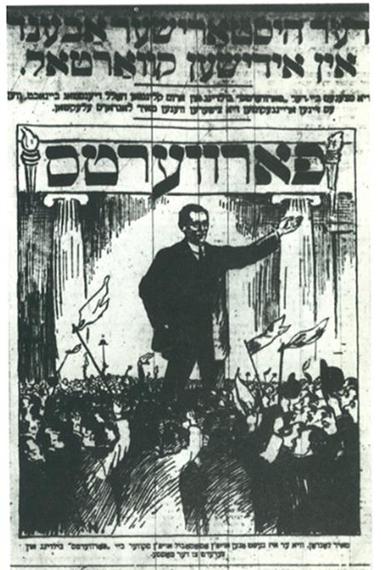On November 4, 1914 Meyer London became the first Socialist on the East Coast (and only the second) to be elected to Congress. At our Tenement Talk, "Meyer London and the Roots of New York Socialism" last Wednesday, we explored the significance of London's election exactly a century ago, drawing upon the Jewish Daily Forward newspaper's articles, editorials and drawings and the observations of historians, descendants and our audience on the significance of this landmark historical event.
On that Election Day, London became a symbol of the eastern European immigrant Jews' standing in and striving for America, both their love for their adopted country as well as their hopes for what many of them believed to be a fuller expression of its justness. In Congress, London used his oratorical skills and understanding of American history and society to advocate for unemployment insurance, worker's protections, child labor laws, and women's equality.
In 1914, the majority of those living at 97 Orchard, the building we interpret at the Lower East Side Tenement Museum, were working class Russian Jewish immigrants and their children. Very likely, some of them joined the 50,000 who gathered at the Forward Building, and on the surrounding streets, to await the election results. Lacking twitter accounts or cable news, they stayed up all night, anxiously and excitedly watching the Forward building's façade, upon which staffers, using a stereopticon, projected the incoming election results from the various districts.
Each time London captured a district, cheers erupted, and the Forward described a rumbling like an "earthquake." When the news came in at 2am that London had vanquished his Tammany opponent, a band struck up the Marseillaise, and "people embraced and kissed each other, with tears of joy. And they yelled hurrah and cheered for socialism, for Meyer London, for the Forward!" At 4am London arrived, borne aloft on his supporters' shoulders. A spontaneous procession snaked through the Lower East Side, the marchers waving brooms to signify a political housecleaning.
The next day, the Forward devoted columns to London's election and its significance; they also published an image of London towering over the Lower East Side.
However, beyond the Lower East Side, other journalists expressed skepticism. The Evening World described London as "undersized" and "spectacled." London, to his credit, understood that the socialist dream would not be achieved in his term. He also surely realized that his reception in Congress would be less enthusiastic than that among his East Broadway fans. Indeed, the key to his success lied in his ability to keep to his socialist ideals, but adapt them to the exigencies of the American process, as well as the varying needs of his audiences. To that point, education, rather than legislative success, quickly emerged as his first priority. As he told the Evening World the day after his election:
I am going to wake up the American people to a realization of the social problem by presenting to Congress the condition of the laboring classes, the problems of child labor, work of women, unemployment and the high cost of living....All of this is a big undertaking, all that the Socialists can expect now is to awaken interest in these problems and to promote an understanding of them...I would consider my principal work to be to attract the attention of the American people to the existence of a social problem in America...
The outbreak of World War I interrupted London's plans to awaken Americans to social problems. Still, as historians Rosalyn Baxandall (and London's great niece), Gordon Goldberg (London's biographer), and Daniel Soyer reflected at the Tenement Talk, London's work helped pave the way for many New Deal achievements.
Indeed, the panelists argues, had London lived (he was killed in an automobile accident in 1926 at the age of 54), he very likely would have played a role in a New Deal administration.
Beyond London's ideals and accomplishments, it is important to emphasize the fervent energy of his supporters. Their willingness to forsake a much-needed night's rest after a typical 12-hour work-day and to stand in the cold and cheer their representative is remarkable. It was only at 8am that the Forward noted that "the gigantic crowd dispersed to go to work in the shops."
It is important that we honor the ordinary people who so honored London, and pause to revive the forgotten lives of those--voters and politicians alike-- who did so much to shape our present. It is equally paramount that we continue to search in our own era for political leaders who will continually awaken us to America's social problems, and whose victories likewise inspire us to stay up all night and celebrate the way London's supporters did.

